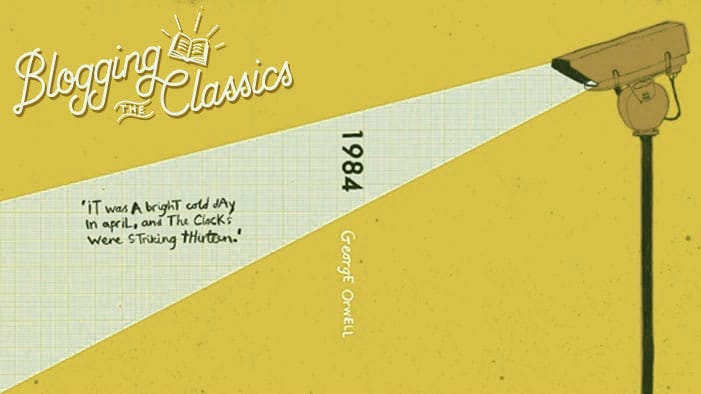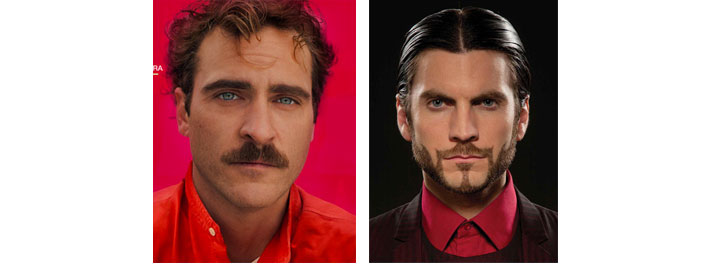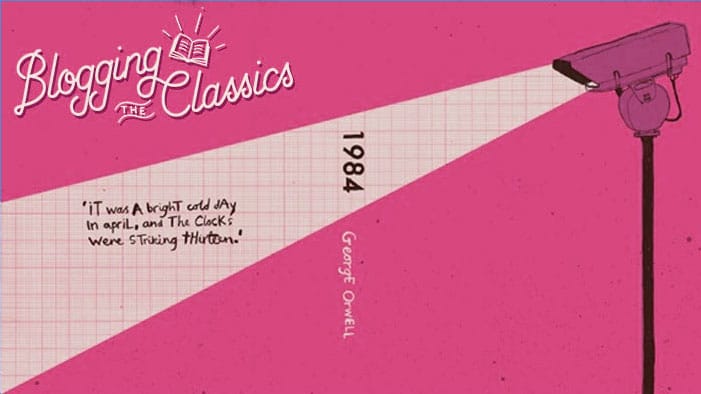Blogging 1984: II (Part 1, Chapters 2 and 3)

It’s just poor old Mrs. Parsons from down the hall (30, but, again, a hard 30 because of the bleakness) who has a blocked sink. The entirety of the Victory Mansions seem to be crumbling, in need of constant repair from the flaking plaster, burst pipes, and general cabbageyness. Picture a college dorm, basically. Inside Mrs. Parsons’ apartment is the detritus of a totalitarian government—

—as well as all the stuff your mom wishes you would just PUT AWAY instead of dumping on the couch / is it SO MUCH TO ASK that you keep her house tidy seeing as you live there rent free—
“hockey sticks, boxing gloves, a burst football, a pair of sweaty shorts turned inside out…”
plus the “scarlet banners of the Youth League and the Spies.” Mrs. Parsons’ kids are in the apartment, hidden in a bedroom, playing a comb in tune with the military music issuing from the box. Her husband, Tom, is a coworker of Winston’s, albeit one of “paralysing stupidity” who is interested only in sports—ah, it is he of the sweaty inside-out footy shorts.
Winston has his arms elbows-deep in the cabbage-water infestation when the seven and nine-year-old Parsons children burst from their room in a game of cops and robbers, only they’re dresses as “Spies” and yelling things like “thought-criminal!” and “traitor!” at each other while pointing toy guns. The children are disappointed that they aren’t allowed to go to the public hanging of Eurasian prisoners in the square that day. Mrs. Parsons definitely isn’t a ~cool mom~.
Far more so than the clump of hair Winston removes from the sink, he is rattled by the children, such enthusiastic participants in the regime. I mean I wouldn’t say I’m especially amenable to children playing shoot-out in Starbucks, but there is something quite malignant at work here. Winston might not remember his childhood, or what year it is, but for these children, memory only just began. Propaganda is all they have known. The Youth League banners seem kind of silly until you remember the Hitler Youth (did you ever read Heinrich Boll’s The Clown? Adolescent grief on top of a post-war existential crisis? I mean, crikey, Hans makes Holden Caulfield look like a sunny Louis Tomlinson in comparison).
On the way out the door, the boy pegs Winston for a game of “stick ’em up” then shoots him with a slingshot in the neck (“Goldstein!”) in a frightening piece of maybe-foreshadowing. Mrs. Parsons looks sad and dusty in apology. Back in his apartment, Winston ponders how terrible children are: for them, the government drills and propaganda are like a game at summer camp. Apparently, children frequently turn their parents over to the Thought Police for “unorthodoxy.” What Orwell seems to be saying is that children are demons who see through us like we are made of nothing more than cookie paper.
“It was almost normal for people over thirty to be frightened of their own children.”
Winston’s thoughts turn to his diary, which he remembers he left fully open on the table (f******k), and he has O’Brien on the brain. An old dream bubbles up in which he sat in the dark and the voice of O’Brien told him, “We shall meet in the place where there is no darkness.” To be straight, Winston isn’t sure if it was a dream, or a reconstruction of a feeling he once had, or something else. LET ME HELP YOU OUT, WINSTON: It’s a metaphor. A raging metaphor.
The telescreen blurps out a wartime update—many death, such victory, wow—and then leads into a rousing rendition of “Oceania, ’tis for thee,” which you are supposed to stand for, like “God Bless America” at the baseball. (I stand but don’t do the hand on heart because I’m not American, and I always feel like someone will deport me for it). Bombs rumble on the edges of London, the wind blows, Big Brother posters flap about, and we glimpse the word INGSOC on a post.
The next few pages are a bit depressing in a “Part of Your World” kind of way—Winston’s thoughts swirling about in a cave of loneliness as he imagines a real human connection somewhere far, far away where men can easily get their hands on a Snorflux. He writes:
“To the future or the past. to a time when thought is free, when men are different from one another and do not live alone—to a time when truth exists and what is done cannot be undone.”
Winston comes upon a vague reminiscence of his mother and sister, a wee baby, sacrificing themselves to save him. He can picture them in the bottom of a well or grave, moving down, disappearing into the dark as their eyes look up at him. There are the first pangs of emotion as he vaguely grasps the fact of his mother’s death:
“Tragedy, he perceived, belonged to the ancient time, to a time when there was still privacy, love and friendship, and when the members of a family stood by one another without needing to know the reason”
*Compare and contrast with the nightmare Parsons siblings.*
Winston’s dreamscape, which, let’s face it, is basically just an extended Coldplay music video, shifts to a golden land of rabbit tracks and pasture bending in the breeze. Dystopian Rey appears and tears her clothes off, flinging them into the field. (You heard him, he doesn’t like her.) Her general repudiation of the Dystopian Jumpsuit seems to “annihilate a whole culture” (spoiler: there is a reason schools have uniforms; it makes you more obedient). Winston says this dream sequence isn’t sexual, and I believe him: nor is any other Coldplay video.
Now we get to my favorite moment from chapters 2 and 3: the Physical Jerks.
As Winston huffs along with the other 30- and 40-year-olds mandated to flex their aging bodies, he works his mind to dig out more memories of his childhood, realizing that without memories, life is a shapeless blur, not a life at all. He recalls a period of peace in his childhood ruptured by an A bomb falling on Colchester; he and his mother and father funneling into a tube station for shelter. He glimpses an old man on the floor of the tube station:
“his face was scarlet and his eyes were blue and full of tears… someone whom the old man loved, a little granddaughter perhaps, had been killed”
Considering the spare language, I find this incredibly moving. The act of remembering this old man, the little girl he lost, is powerful. It’s a gigantic middle three fingers to Big Brother.
Winston is still health-hustling, by the way—”with hands on hips, they were gyrating their bodies from the waist, an exercise that was supposed to be good for the back muscles“—
So good.
Winston realizes that while the telescreen has been blurting on about beating the mortal enemy Eurasia, they had, not four years ago, been at war with Eastasia. He traces a line of constant war back to the time in the tube station in his childhood. The victory the Party had won wasn’t over Eastasia or Eurasia, it was over the minds of the citizens of Oceania, over their collective memories.
“who controls the past controls the future: who controls the present controls the past”
This is 🔑 🔑 🔑 . Mark it in your contraband diaries, readers.
Winston is having some major doublethinkâ„¢ breakthroughs—Big Brother didn’t even exist until the ’60s, even though he has been backdated to the ’30s by the Party—when the telescreen reprimands him by name for not bending over his toes hard enough (my every yoga nightmare). Suddenly, he lurches forward and touches his toes. Go, Winston!
Notes:
Winston has had a quite a few breakthroughs in a single lunch-hour. I almost feel bad for spending mine scrolling endlessly past jumpsuits on Polyvore while eating a terrible croissant from Pret.
Memory, though: If you have read The Giver, Lois Lowry takes this piece of Orwellian philosophy and makes it the entire basis of her story. Who are we without memory? Is a human without free thought, without the ability to remember anything, even a human? What would we even do without nostalgic Buzzfeed listicles?
O’Brien. I’m pretty excited to get to know O’Brien a little better, and find out how he has managed to telekinetically enter the realm of Winston’s illegal memory banks.
Leave your predictions and thoughts below!
Find all of Janet’s 1984 blog here, and find our Blogging the Classics index page here.














